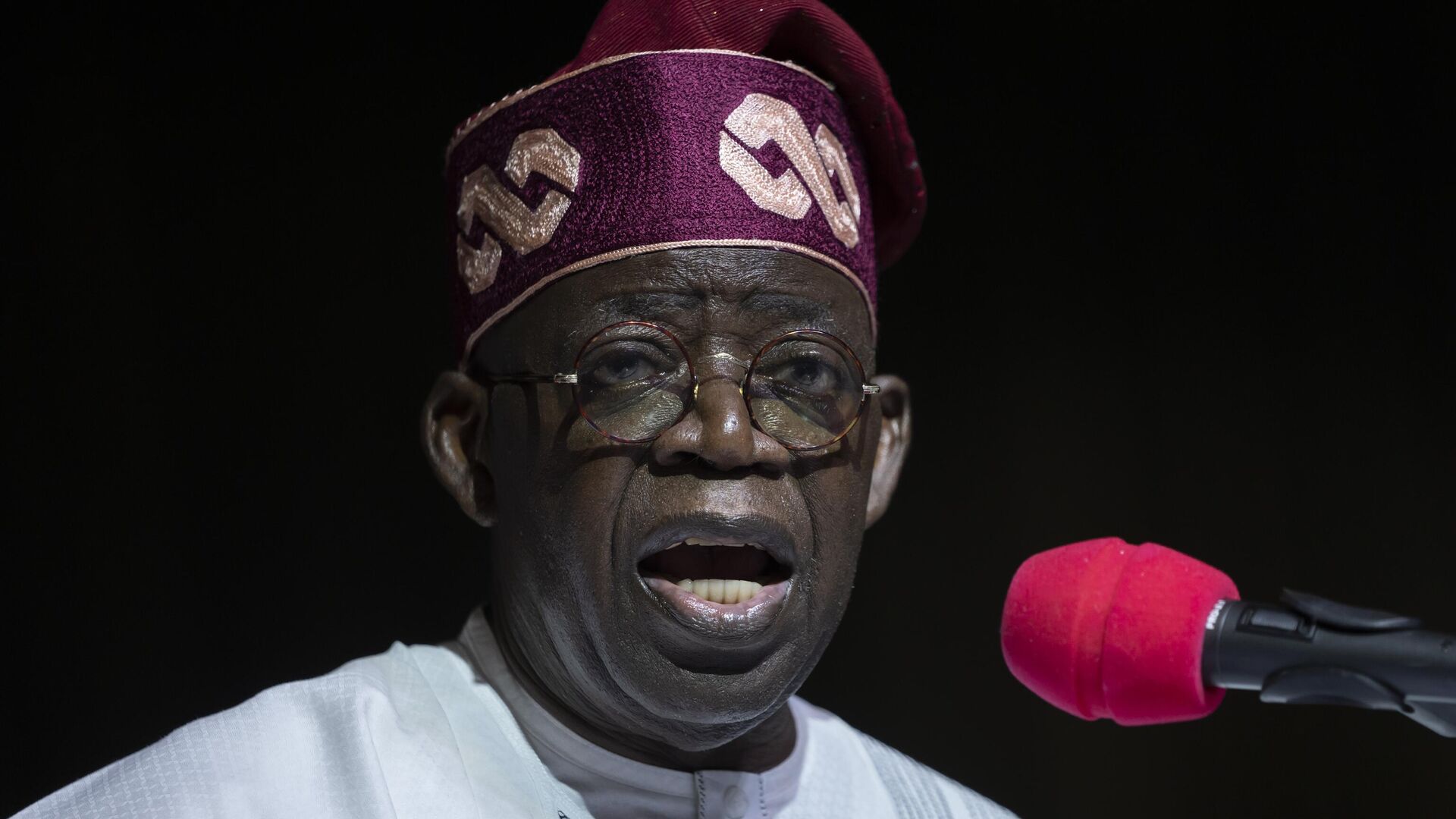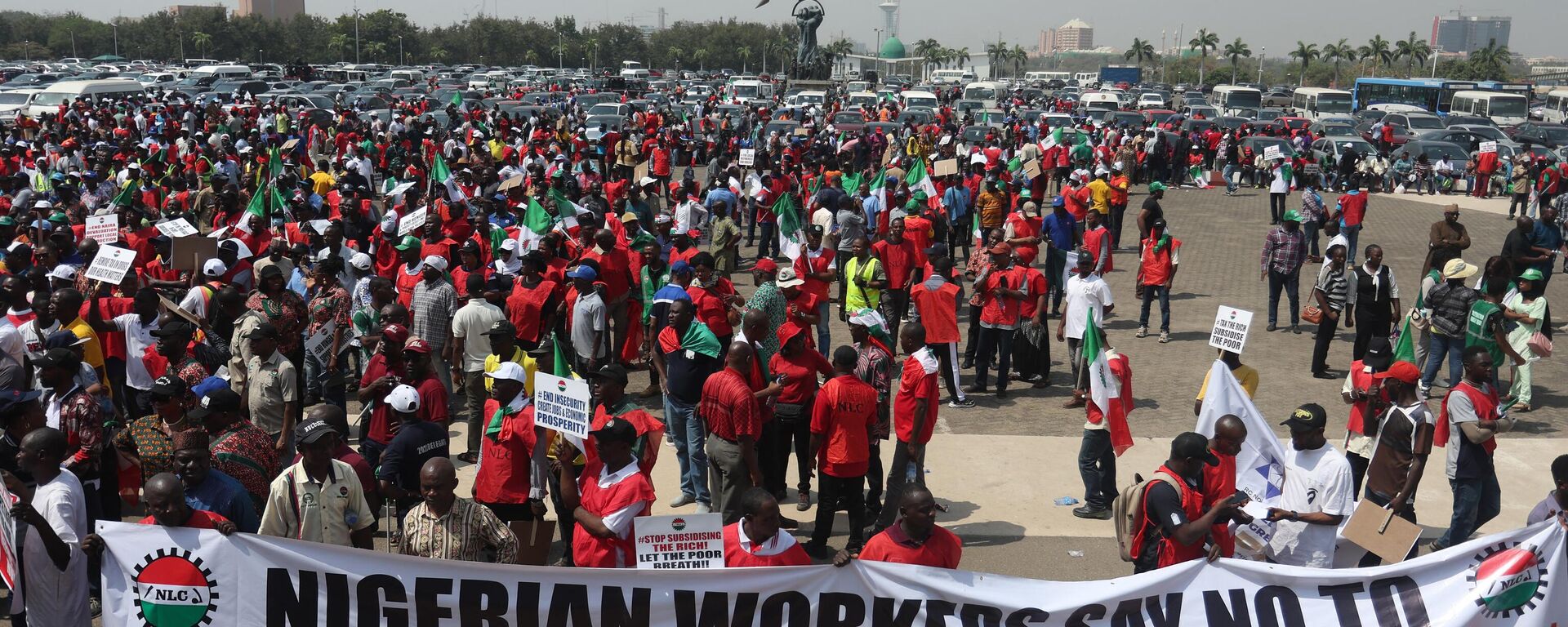https://en.sputniknews.africa/20240612/nigerias-tinubu-vows-to-continue-economic-reforms-introduce-bill-for-new-minimum-wage-1067020363.html
Nigeria's Tinubu Vows to Continue Economic Reforms, Introduce Bill for New Minimum Wage
Nigeria's Tinubu Vows to Continue Economic Reforms, Introduce Bill for New Minimum Wage
Sputnik Africa
To observe 25 years of uninterrupted democratic rule in the country and to celebrate Democracy Day in 2024, commemorated annually on June 12, the Nigerian... 12.06.2024, Sputnik Africa
2024-06-12T19:49+0200
2024-06-12T19:49+0200
2024-06-13T10:52+0200
sub-saharan africa
nigeria
bola tinubu
west africa
legislation
politics
economy
government
reforms
salary
https://cdn1.img.sputniknews.africa/img/07e8/01/01/1064411612_0:200:3072:1928_1920x0_80_0_0_345f956a3142ea052907e3b816c6006b.jpg
Nigeria's President Bola Tinubu on Wednesday acknowledged the economic difficulties in the nation and empathized with fellow Nigerians, promising the nation to move forward with reforms in order to strengthen the basis for prospective growth.Despite mounting difficulties that have stoked popular unrest, economic reforms would go on, and an executive measure to the National Assembly would be presented shortly that would establish a new minimum wage, he underlined.In May last year, Tinubu removed a petrol subsidy that kept prices artificially low and devalued the currency, which sent inflation soaring to over 33% in April—its highest level in more than three decades—and the nation's incomes began to fall.The economic difficulties also included higher interest rates and the partial elimination of electricity subsidies, but the president underlined that reforms that have been initiated "are intended to create a stronger, better foundation for future growth."In response to labor unions' demands of 250,000 naira (about $166) per month, the government has proposed to double the minimum salary to 62,000 naira (about $41) per month. The last minimum wage was established in 2019 at the level of 30,000 naira (some $20).Yet, Tinubu did not specify if a new figure of the minimum wage or the government's proposal would be included in the measure. Following this, labor union officials have stated that they would like to hear back from the president before making the next moves.
https://en.sputniknews.africa/20240609/workers-certain-death-labor-union-criticizes-governors-for-calling-new-min-wage-unsustainable-1066952739.html
nigeria
west africa
Sputnik Africa
feedback@sputniknews.com
+74956456601
MIA „Rossiya Segodnya“
2024
News
en_EN
Sputnik Africa
feedback@sputniknews.com
+74956456601
MIA „Rossiya Segodnya“
Sputnik Africa
feedback@sputniknews.com
+74956456601
MIA „Rossiya Segodnya“
nigeria, bola tinubu, west africa, legislation, politics, economy, government, reforms, salary, president, democracy, democracy day
nigeria, bola tinubu, west africa, legislation, politics, economy, government, reforms, salary, president, democracy, democracy day
Nigeria's Tinubu Vows to Continue Economic Reforms, Introduce Bill for New Minimum Wage
19:49 12.06.2024 (Updated: 10:52 13.06.2024) To observe 25 years of uninterrupted democratic rule in the country and to celebrate Democracy Day in 2024, commemorated annually on June 12, the Nigerian president addressed the nation in a broadcast.
Nigeria's President Bola Tinubu on Wednesday acknowledged the economic difficulties in the nation and empathized with fellow Nigerians, promising the nation to move forward with reforms in order to strengthen the basis for prospective growth.
"Our economy has been in desperate need of reform for decades. It has been unbalanced because it was built on the flawed foundation of over-reliance on revenues from the exploitation of oil," Tinubu said in a televised address.
Despite mounting difficulties that have stoked popular unrest, economic reforms would go on, and an executive measure to the National Assembly would be presented shortly that would
establish a new minimum wage, he underlined.
“In this spirit, we have negotiated in good faith and with open arms with organized labor on a new national minimum wage. We shall soon send an executive bill to the National Assembly to enshrine what has been agreed upon as part of our law for the next five years or less,” he said.
In May last year, Tinubu removed a petrol subsidy that kept prices artificially low and devalued the currency, which sent inflation
soaring to over 33% in April—its highest level in more than three decades—and the nation's incomes began to fall.
"As we continue to reform the economy, I shall always listen to the people and will never turn my back on you," the leader pledged.
The economic difficulties also included higher interest rates and the partial elimination of electricity subsidies, but the president underlined that reforms that have been initiated "are intended to create a stronger, better foundation for future growth."
"The reforms we have initiated are intended to create a stronger, better foundation for future growth. There is no doubt the reforms have occasioned hardship. Yet, they are necessary repairs required to fix the economy over the long run so that everyone has access to economic opportunity, fair pay, and compensation for his endeavor and labor," he said.
In response to labor unions' demands of 250,000 naira (about $166) per month, the government has proposed to double the minimum salary to 62,000 naira (about $41) per month. The last
minimum wage was established in 2019 at the level of 30,000 naira (some $20).
Yet, Tinubu did not specify if a new figure of the minimum wage or the government's proposal would be included in the measure. Following this,
labor union officials have stated that they would like to hear back from the president before making the next moves.


